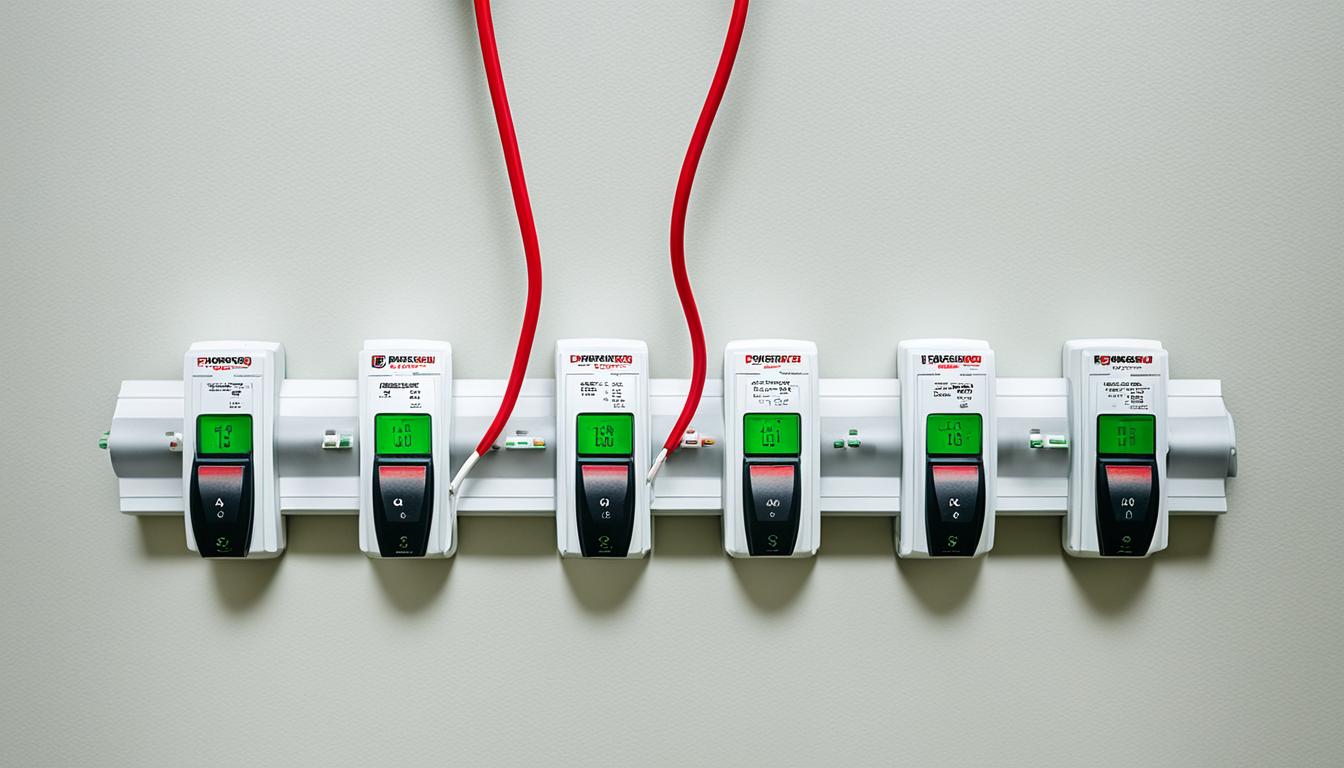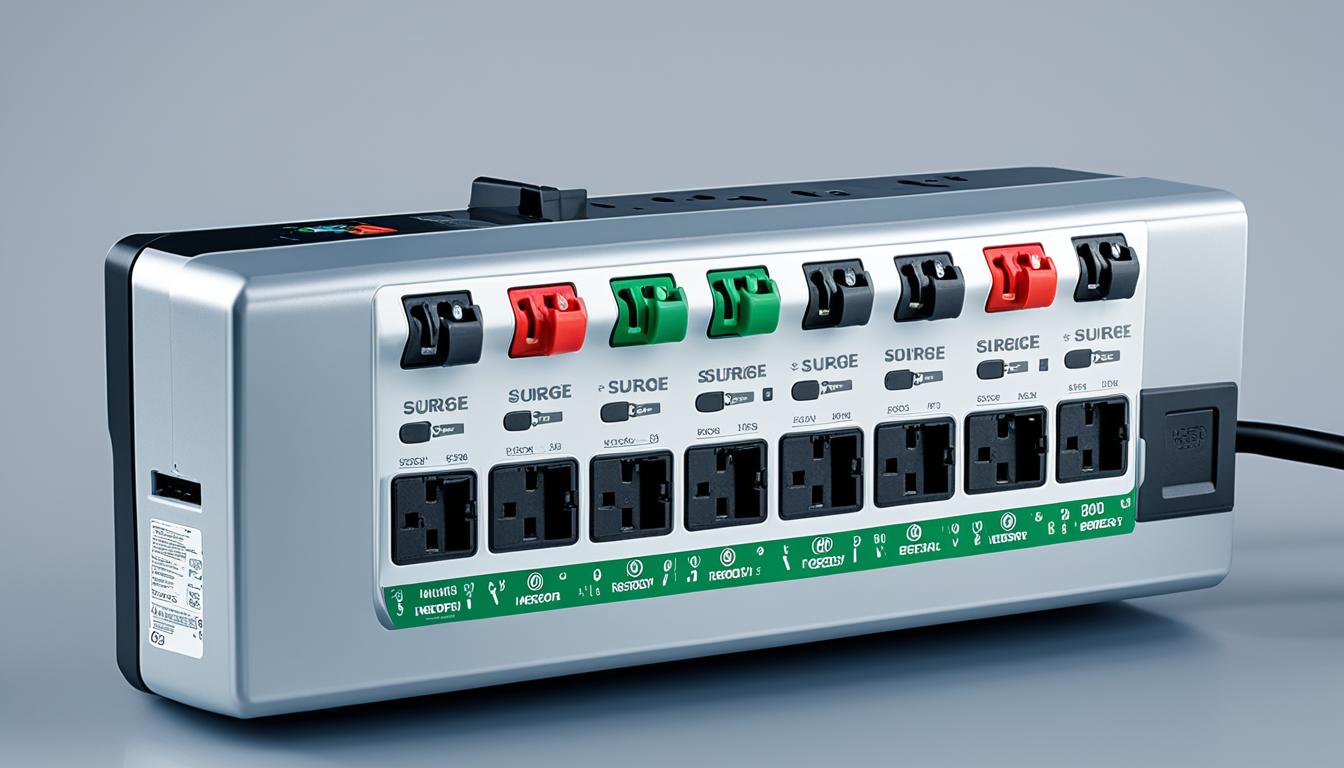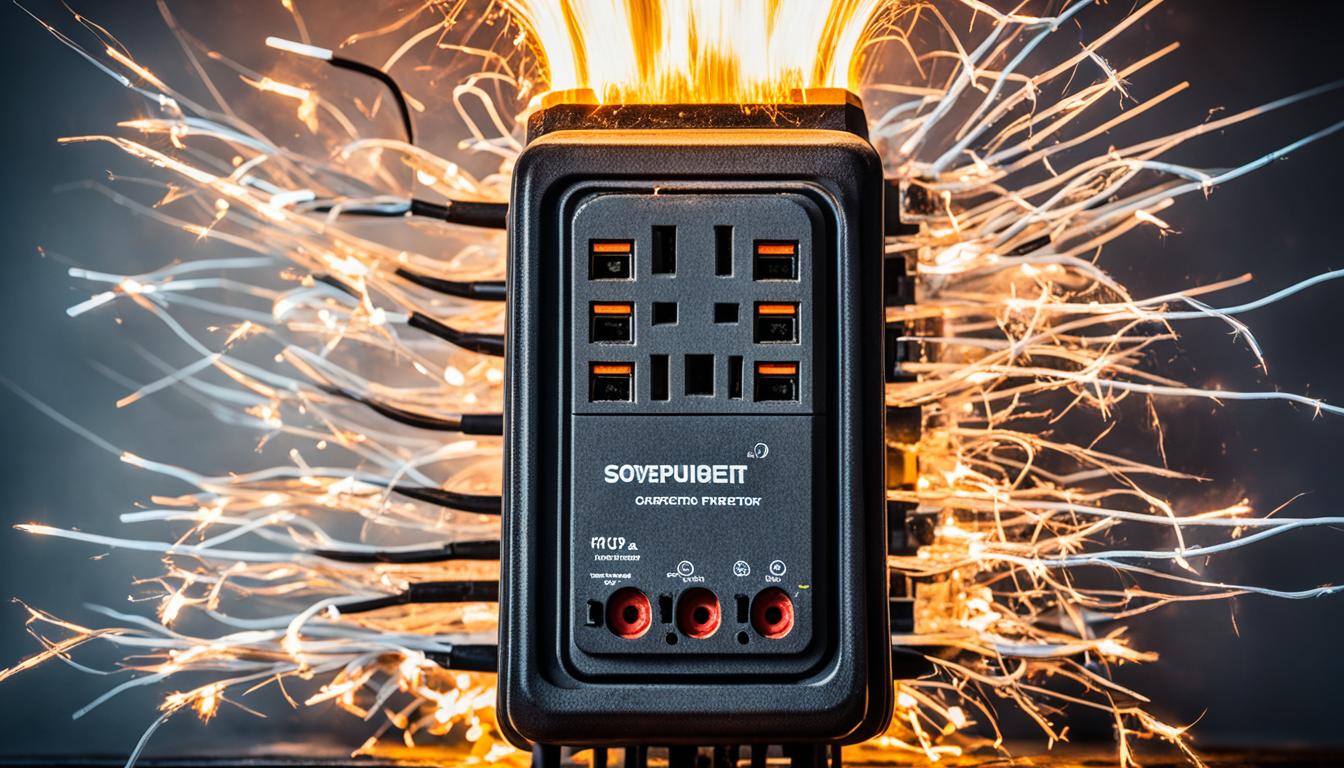Extension cords and surge protectors serve different purposes when it comes to electrical safety. While an extension cord allows you to extend the reach of an electrical outlet, a surge protector provides protection against power surges. It’s important to understand the distinctions between these two devices to ensure the safety of your electronic appliances and devices.
In this article, we will explore the differences between extension cords and surge protectors and provide recommendations for suitable options. Whether you’re looking for a surge protector extension cord or a power strip with surge protection, we’ve got you covered!
Key Takeaways:
- Extension cords and surge protectors serve different purposes.
- An extension cord extends the reach of an electrical outlet, while a surge protector protects against power surges.
- Using an extension cord with a surge protector is not recommended due to safety risks.
- Consider the gauge size of both the extension cord and surge protector when using them together.
- There are options available for surge protector extension cord combinations and power strips with surge protection.
Power Strip vs Extension Cord: Major Differences
When it comes to powering your electronic devices, understanding the differences between a power strip and an extension cord is essential. While they may seem similar at first glance, these two devices serve distinct purposes and offer unique benefits. Let’s explore the major differences between power strips and extension cords to help you make an informed decision for your specific needs.
Power Strip
A power strip is a convenient device that expands the number of electrical outlets available in a single location. It typically features multiple outlets, allowing you to plug in several devices simultaneously. Power strips often come equipped with surge protection, ensuring that your valuable electronics are safe from voltage spikes. Some advanced power strips even include additional features such as USB ports, LED indicators, and energy-saving capabilities.
Extension Cord
An extension cord, on the other hand, is a long cable that extends the reach of an electrical outlet. It enables you to connect devices that are far away from the power source, providing flexibility and convenience. Extension cords come in various lengths and gauge sizes to accommodate different power requirements. However, it’s important to note that extension cords do not typically offer surge protection, so additional precautions may be necessary to safeguard your electronics.
In summary, the key differences between power strips and extension cords are:
| Power Strip | Extension Cord |
|---|---|
| Expands the number of electrical outlets | Extends the reach of an electrical outlet |
| May include surge protection | Does not typically include surge protection |
| Additional features like USB ports | No additional features |
Now that you understand the major differences between power strips and extension cords, you can confidently choose the right option based on your specific requirements. Whether you need extra outlets for your workstation or a longer cable to reach your appliances, selecting the appropriate device ensures both convenience and safety for your electrical setup.
Can We Use an Extension Cord with a Surge Protector?
When it comes to using an extension cord with a surge protector, it’s important to consider safety and compatibility. While it may seem convenient to connect both devices, it is not recommended due to potential safety risks. The National Fire Protection Association (NFPA) guidelines advise against using an extension cord with a surge protector to prevent fire hazards.
Extension cords and surge protectors serve different purposes. An extension cord allows you to extend the reach of an electrical outlet, while a surge protector provides protection against power surges. Combining these two devices can overload the circuit and lead to overheating, which increases the risk of a fire.
However, if both the extension cord and surge protector are brand new and in good condition, it is possible to use them together for a limited period. It is crucial to consider safety considerations, such as the gauge size of the extension cord and surge protector. Using a compatible combination of extension cord and surge protector is essential to ensure proper usage and minimize safety risks.
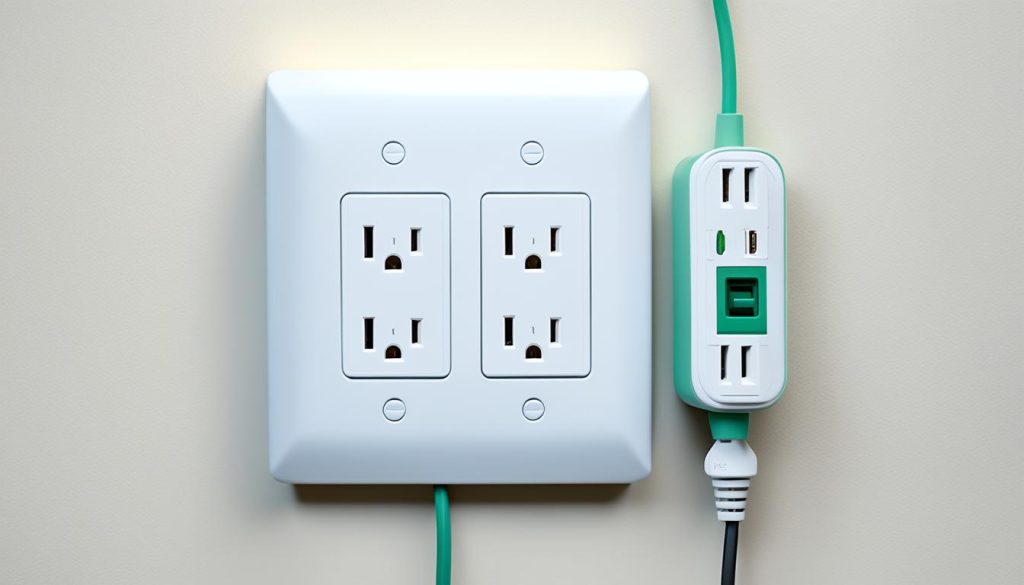
Using an extension cord with a surge protector should be approached with caution. If you need to use both devices simultaneously, it is best to invest in a surge-protected power strip. Power strips are designed to handle multiple devices safely, reducing the risk of overloading the circuit.
In conclusion, while it is not recommended to use an extension cord with a surge protector, it may be possible in specific circumstances. However, exercise caution and prioritize safety to protect your electrical devices and prevent potential hazards.
Safety Considerations
When using an extension cord with a surge protector, it is crucial to prioritize safety. By following these guidelines and considering the potential risks, you can ensure the safe use of these devices.
Safety Consideration 1: Device Condition
Before connecting an extension cord with a surge protector, it is important to inspect both devices for any signs of wear or damage. Frayed wires, loose connections, or exposed conductors can increase the risk of electrical hazards. Make sure that both the extension cord and surge protector are in good condition before use.
Safety Consideration 2: Gauge Size
The gauge size of both the extension cord and surge protector plays a crucial role in ensuring safety. Ideally, the gauge size of both devices should match. If both the extension cord and surge protector have a gauge size of 14, they can be safely used together. However, if the gauge size of the extension cord is 14 and the surge protector is 13, it is recommended to avoid using them together. In such cases, there is an increased risk of overheating and fire.
| Safety Risk | Guidelines |
|---|---|
| Overheating | Ensure the extension cord and surge protector have the same gauge size (ideally 14) to prevent overloading and overheating. |
| Fire Hazards | Avoid using an extension cord with a surge protector if their gauge sizes do not match, as it increases the risk of fire. |
| Improved Safety | Always prioritize safety by using devices that are in good condition and properly matched in terms of gauge size. |
By considering these safety factors, you can minimize the risks associated with using an extension cord with a surge protector. Prioritizing safety ensures a safe and reliable power supply for your devices, protecting both your electrical equipment and your overall well-being.
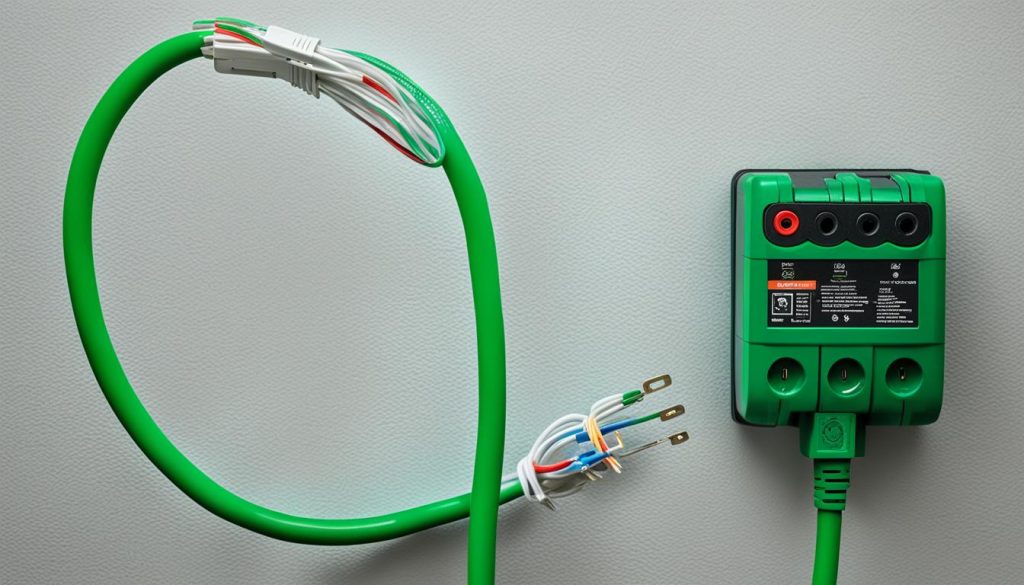
Options for Surge Protector and Extension Cord Combinations
If you are in need of a surge protector and extension cord combination, there are several suitable options available to meet your needs. These recommended surge protectors and extension cords provide both functionality and safety for your electrical devices.
EVVR Energy Monitoring Smart Plug and Relay
The EVVR Energy Monitoring Smart Plug and Relay is an excellent all-in-one solution for those looking for a surge protector extension cord combination. This innovative device not only offers surge protection but also features energy-saving design, automation scenes, and overload protection. With the EVVR Energy Monitoring Smart Plug and Relay, you can conveniently power your devices while ensuring their safety.
GE 6-Foot Extension Cord
If you require a reliable indoor extension cord with surge protection, the GE 6-Foot Extension Cord is a great choice. This extension cord is equipped with three outlets and a patented rotary socket for enhanced safety. The GE 6-Foot Extension Cord provides a secure and convenient way to extend the reach of your electrical outlets while safeguarding your devices against power surges.
Anker Power Port Strip
For those in need of a power strip with surge protection, the Anker Power Port Strip is the ideal option. This power strip offers 12 outlets, allowing you to connect multiple devices simultaneously. It also features USB charging ports and overload protection, ensuring the safety of your electronics. With the Anker Power Port Strip, you can power and protect your devices with ease and convenience.
| Combination Option | Features |
|---|---|
| EVVR Energy Monitoring Smart Plug and Relay | Surge protection, energy-saving design, automation scenes, overload protection |
| GE 6-Foot Extension Cord | Indoor use, three outlets, patented rotary socket for safety |
| Anker Power Port Strip | 12 outlets, USB charging ports, overload protection |
With these surge protector and extension cord combinations, you can ensure the safety and convenience of powering your electronic devices. Choose the option that best fits your needs and enjoy the peace of mind that comes with reliable surge protection and extended reach.
Importance of Surge Protectors for Electronics
Surge protectors play a vital role in safeguarding your valuable electronic devices from the harmful effects of power surges. Power surges can occur unexpectedly due to various factors such as lightning strikes, short circuits, and power outages. These surges can result in a sudden influx of voltage, posing a serious risk to your electronics.
Without a surge protector, your devices are vulnerable to potential damage and can incur significant repair or replacement costs. Surge protectors work by absorbing and dispersing excess voltage, effectively preventing it from reaching your valuable electronics. By doing so, surge protectors serve as a barrier of defense, ensuring the longevity and optimal performance of your electronics.
Investing in surge protectors not only provides essential protection for your devices but also offers several benefits. First and foremost, surge protectors offer peace of mind, knowing that your electronics are shielded from power surges. Additionally, they provide a convenient and cost-effective solution to protect multiple devices simultaneously.
By using surge protectors, you can confidently connect your electronic devices such as computers, TVs, gaming consoles, and home appliances without worrying about power surges. Whether it’s a sudden electrical surge caused by a lightning strike or a voltage spike due to a faulty power source, surge protectors ensure your devices remain safe and protected.
FAQ
Do extension cords have surge protectors?
No, extension cords and surge protectors serve different purposes. An extension cord extends the reach of an electrical outlet, while a surge protector provides protection against power surges. It is important to understand the differences between these devices to ensure the safety of your electronic devices.
What is the difference between a power strip and an extension cord?
A power strip is a device with multiple electrical outlets that allows you to plug in multiple devices. An extension cord, on the other hand, is a cable that extends the reach of an electrical outlet. Power strips often come with additional features like USB ports, while extension cords simply provide a longer cable length.
Can I use an extension cord with a surge protector?
It is generally not recommended to use an extension cord with a surge protector due to potential safety risks. The National Fire Protection Association advises against this practice as it can increase the likelihood of fire hazards. However, if both devices are new and in good condition, they can be connected for a limited period. Safety considerations such as the gauge size of both the extension cord and surge protector should be taken into account.
What safety considerations should I take when using an extension cord with a surge protector?
When using an extension cord with a surge protector, it is important to ensure that both devices are in good condition and not worn out. If the extension cord and surge protector have a gauge size of 14, they can be safely used together. However, if the gauge size of the extension cord is 14 and the surge protector is 13, there is an increased risk of a fire. Following these guidelines can help minimize safety risks.
Are there options available for surge protector and extension cord combinations?
Yes, there are several options available if you are looking for a combination of a surge protector and extension cord. One example is the EVVR Energy Monitoring Smart Plug and Relay, which offers both surge protection and extension cord functionality. Another option is the GE 6-Foot Extension Cord, a reliable indoor extension cord with 3 outlets and a patented rotary socket for safety. If you are looking for a power strip with surge protection, the Anker Power Port Strip offers 12 outlets, USB charging ports, and overload protection.
Why are surge protectors important for electronics?
Surge protectors play a vital role in protecting your valuable electronic devices from power surges. Power surges can be caused by factors such as lightning strikes, short circuits, and power outages. Without surge protection, these surges can potentially damage your electronics and lead to costly repairs or replacements. Surge protectors absorb and disperse the excess voltage, keeping your devices safe from harm. Investing in surge protectors for your electronics is a wise decision to ensure their longevity and prevent potential damage.
